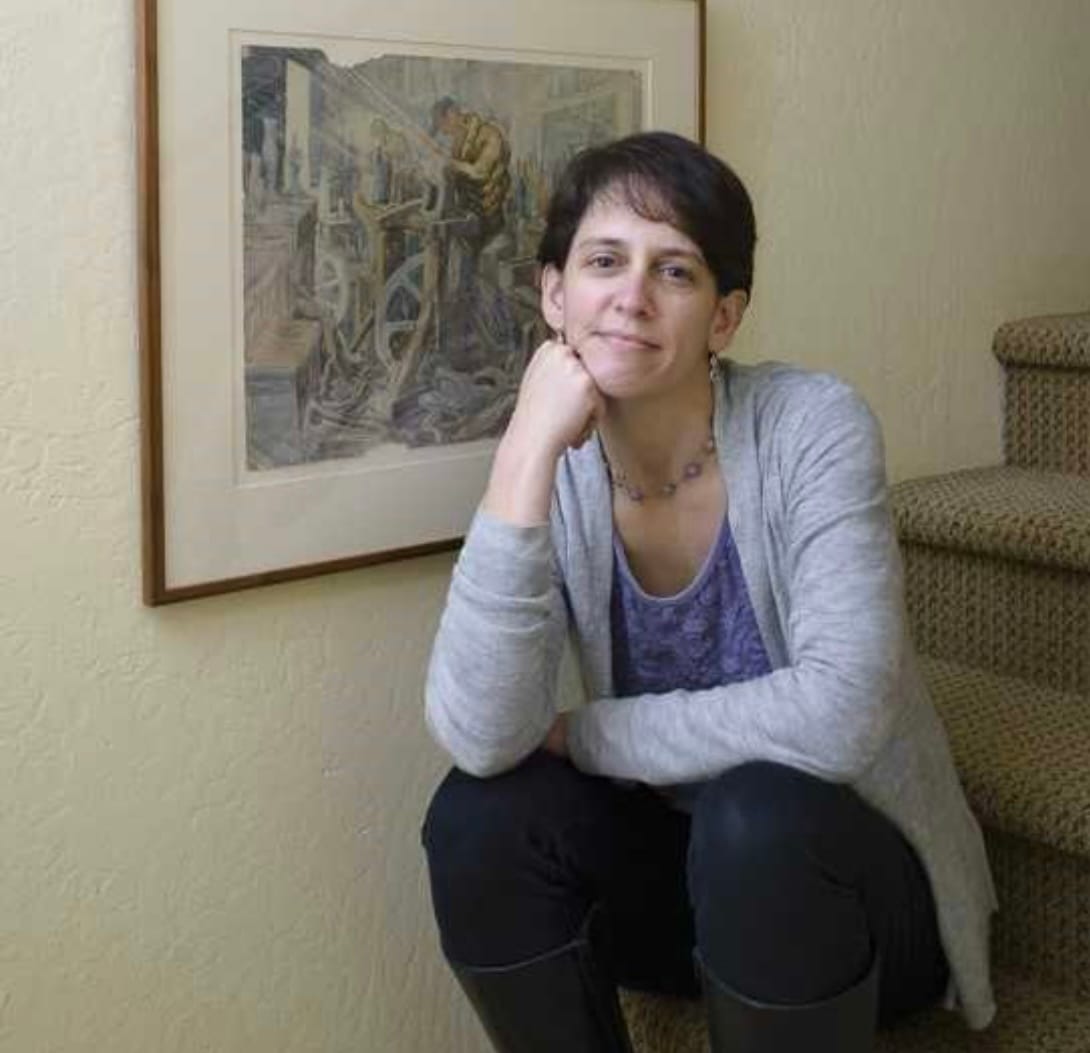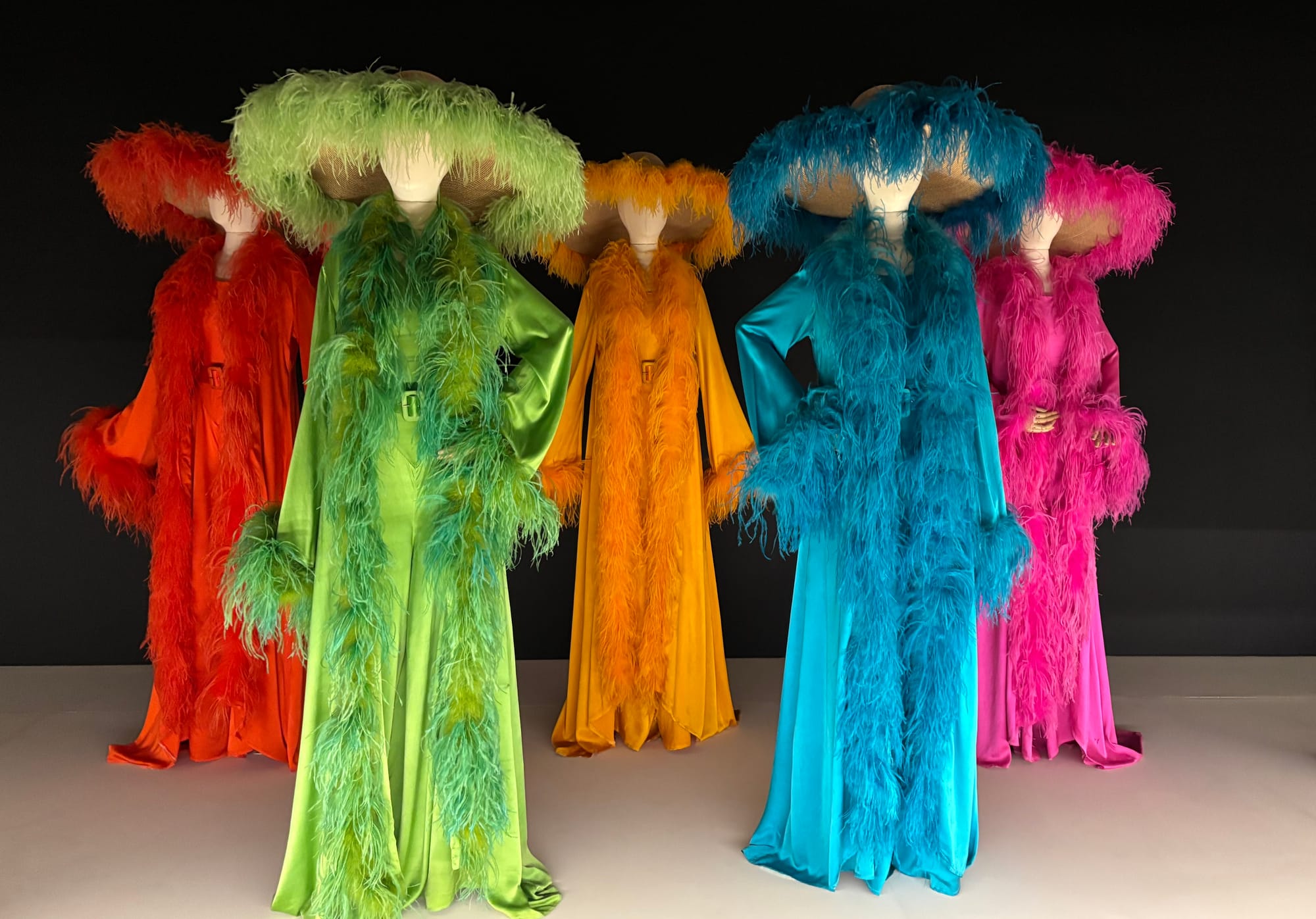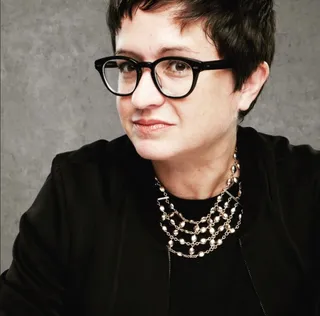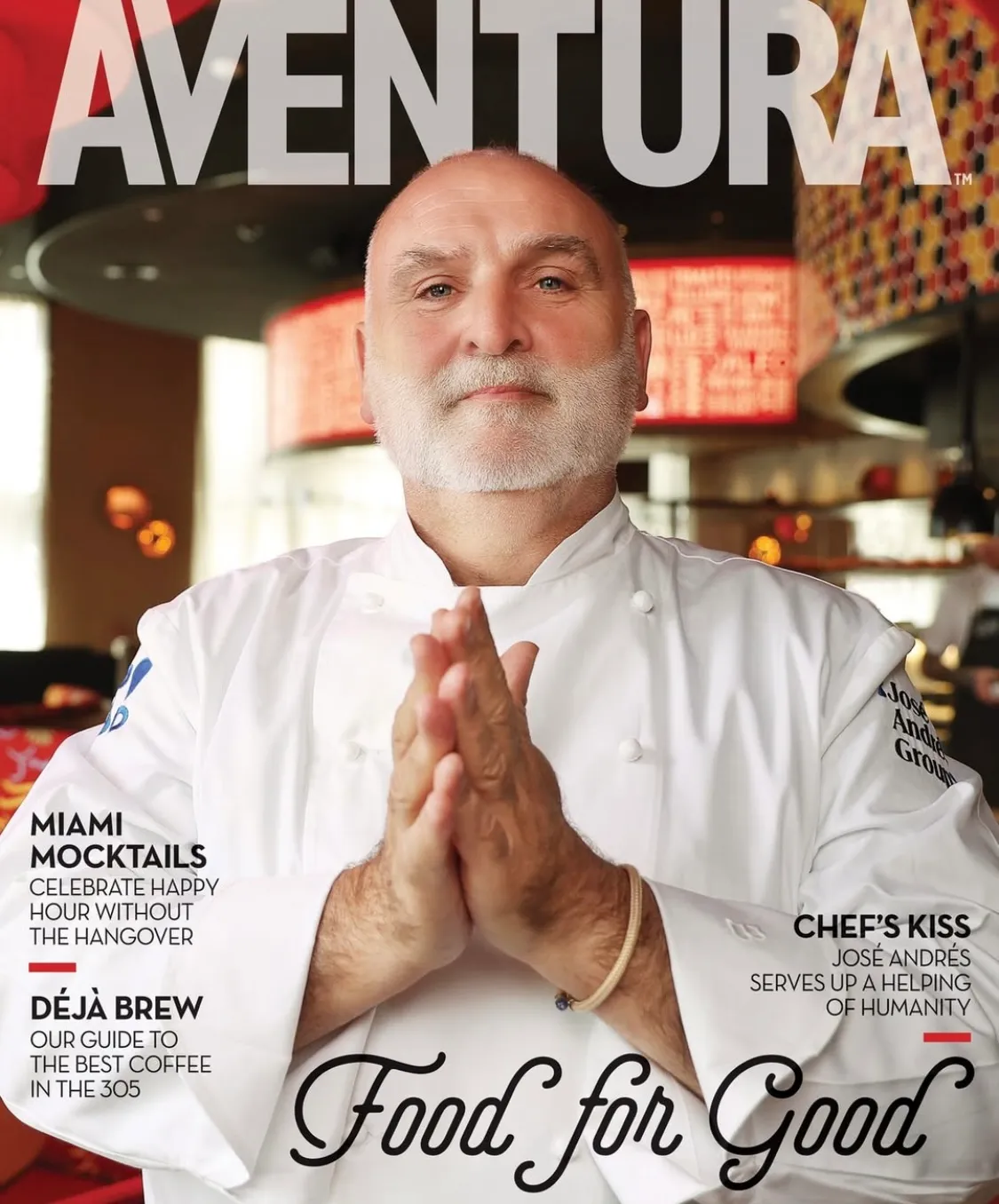That Sinking Feeling
"The thread of family history has always intrigued me. It’s probably the most complex, layered narrative we can tell." -- Elizabeth Rynecki

Author Elizabeth Rynecki connects the personal with the universal in her stories, the most recent of which involves her efforts to help her son with ADHD.
I first got to know Elizabeth Rynecki via social media. At the time, we were both promoting books that were World War II-adjacent. Mine was about a woman who was among those fighting to free occupied France. Hers was about her Polish-Jewish great-grandfather, Moshe Rynecki, an acclaimed artist who died in a concentration camp. But it was also about Elizabeth's herculean efforts to recover her great-grandfather's lost paintings.
Elizabeth is with us this week to talk about her new podcast, "That Sinking Feeling," which once again mines family history to present a story about her herculean efforts to help her son, who was diagnosed with ADHD. But she's also here to talk about the power of family history and experimenting with storytelling across different media.
Here's what she had to say.
Tell us a bit about yourself and about how and why you became passionate about storytelling.
My narrative non-fiction memoir, Chasing Portraits: A Great Granddaughter’s Quest for Her Lost Art Legacy was published by NAL/Penguin Random House in 2016 and received a Kirkus Starred Review. I wrote, produced, and appeared in the documentary film, Chasing Portraits (distributed by First Run Features). My podcast, That Sinking Feeling: Adventures in ADHD and Ship Salvage is a limited edition, six episode podcast. I have a BA in Rhetoric from Bates College and an MA in Rhetoric and Communication from UC Davis. I live in Oakland, California with my husband, two sons, and three black cats.
I’ve always loved stories. I told my first story when I was eight. My mom typed up Elephant and Squirrel. I illustrated it. It’s about friendship.
Throughout grade school, high school, and college, I mostly wrote analytical essays, rarely venturing into fiction. In graduate school I began writing personal essays about my family’s Holocaust survival story. After leaving academia, I spent over a decade researching my family’s history and sharing my findings through a blog, website, and social media.
Storytelling, for me, is a way to connect the personal and the universal.
Some people write thrillers. Others write romances. Your work so far has revolved around your family and searching for things you may never find. What was it about these two particular narrative threads that exerted such a strong pull on you?
The thread of family history has always intrigued me. It’s probably the most complex, layered narrative we can tell. We inherit not only our DNA from our families but also their stories—their triumphs, their struggles, and the gaps in between. These stories shape how we see ourselves and the world, even if we don’t always understand the full picture. I’ve always been fascinated by the idea of how a history, not exactly our own, influences our own lives.
I’ve found that the more I try to piece together the past, the more I uncover about the present. And while that can sometimes be an emotional roller coaster, the journey is immensely rewarding.
You’ve written recently about the importance of storytelling in different media. What was it about your first book, Chasing Portraits, that lent itself well to a companion documentary?
Chasing Portraits was always a very visual story. I actually tried to make the documentary before I wrote the book. But the cost of making the film became a barrier to the project. Writing the book circumnavigated the expense of the film.
I call the Chasing Portraits book and film companion pieces because the documentary is very much a contemporary story. I never wanted to go back and re-create wartime footage. I wanted the film to be very much in the present of me looking into the past, trying to sort out the history of what happened to my great-grandfather’s paintings.
The book gave me space to work with my grandpa George’s memoir as well as archival materials and historical knowledge to delve back in time. In the book I could put scenes on the written page that I never felt were appropriate for me to recreate cinematically.
Who are some of your favorite storytellers and why? Which of them have navigated multiple media in the way you have?
I found a lot of inspiration for our podcast in John Green’s "The Anthropocene Reviewed" podcast. His book with the transcription of the episodes is good too, but his delivery in the podcast is incredibly personable and compelling. Green is definitely someone who has worked in multiple media; he’s an author, a vlogger, and podcaster.
Sarah Polley is a storyteller who has moved pretty seamlessly between acting, directing, and writing. I loved her film, The Stories We Tell, and her book, Run Towards the Danger. The thing that most unites her work is her ability to bring humanity, empathy, and complexity to a wide array of media.
While perhaps more academic in nature, Brené Brown has created a vast library of work spanning books, TED Talks, podcasts, and even a Netflix special. Her storytelling style is both research-driven, but also incredibly personal, and she’s done an impressive job of translating her style across a variety of platforms.
When your son was diagnosed with ADHD, what were some of the challenges you faced getting him the help he needed?
ADHD is often associated with struggles like difficulty sitting still and paying attention. But what I didn’t realize was that ADHD also comes with the ability to hyperfocus, which is often overlooked. No one ever explained this to me, so because my son could concentrate on certain things for long periods of time, I didn’t think an ADHD diagnosis was relevant for him.
On top of that, my son’s biggest struggles were always social/emotional, and I don’t recall anyone ever explicitly explaining to me that his angry outbursts and emotional volatility were directly connected to his ADHD. Maybe if I had understood that earlier it would have changed the way I tried to help him. But even so, it’s hard to know what help to seek, because there’s an absurdly wide range of specialists out there. We consulted with psychiatrists (who prescribe medications), marriage and family therapists, psychologists, behavioral therapists, occupational therapists, tutors, school specialists, licensed clinical social workers, an ADHD coach, and pediatricians. We never spoke to an attorney, but some families do.
Some specialists seemed helpful, for a while. But then Owen would tire of them. Or we would feel like they didn’t quite get it. Or our needs shifted and so what seemed like a good solution at the time, just didn’t seem quite right anymore. A lot of people would love it if taking medication or some other magical cure might make ADHD simply disappear. It doesn’t work like that. ADHD never goes away. And so coming up with multilayered strategies and a support network is essential, but doing that can be hard and exhausting.
As you were trying to help your son, you were drawn to learning more about your father’s career in ship salvage. What was it about your father’s career that interested you so much? And, at what point did you start seeing narrative links between his story and your son’s diagnosis?
I’ve always been fascinated by my Dad’s career as a ship salvage engineer. In part because it’s such an unusual and niche profession. But also because it was a part of my Dad’s life I didn’t totally understand.
I’d be hard pressed to explain the technical challenges of salvaging ships, but as my Dad walked me through the big picture logistics of his more memorable jobs, I began to hear a subtext; metaphors about my relationship with my son and his ADHD struggles. In some incredibly compelling and personally transformative ways, the salvage jobs mirrored the emotional landscape I was walking through with my son. I thought that experience might be interesting for others. And early on I knew I didn’t want to write a prescriptive book. Instead, I wanted to write about a lived experience. I thought and hoped others might see echoes of their own experiences in my own.
You’ve mentioned that you first attempted to merge these two narrative threads together for a book project, but members of your writing group didn’t understand how you’d do it. They told you to follow your heart though, and where did that lead?
It made me realize that I could tell the story that I wanted to, but that I needed to keep the minutiae to a minimum. As a reader I’m always drawn to human interest stories and I understand that what makes memoirs compelling is an author’s willingness to be vulnerable about their experiences. After I got to a draft I felt proud about, I asked a member of my writing accountability group if she’d take a pass at it. She loved the personal stories about Owen, but thought I should chuck the ship salvage stories. They just didn’t resonate with her. My take away wasn’t that I should get rid of the ship salvage stories, but that I needed to find ways to make them more accessible and compelling.
A friend of yours loved the story and thought it would make a terrific podcast. How did things progress from there?
My podcasting partner is Tony Kaplan. We first met through a mutual documentary film friend. Then Tony shot a bit of footage for my documentary film, Chasing Portraits. Later on we discovered that we had a lot of other funny, “isn’t it a small world?!” connections.
Tony, his wife, and my husband and I started getting together for dinners every so often. At one of those, Tony and I started talking about ADHD and neurodiversity. I told him about my book project and how I was spinning my wheels on it. I couldn’t get a literary agent interested. I mentioned that I was thinking of going into the recording studio to make an audio version of one of the chapters. I’d enjoyed doing the voice over for the documentary film and I thought maybe if I made a small audio excerpt, a literary agent might better understand my vision and take me on as a client.
That prompted Tony to ask if he could read the manuscript. He’s an Emmy-nominated documentary director, cinematographer and filmmaker who had 20+ years of experience as a creative content lead at Pixar. Of course I said he could read it.
Later Tony came back and asked if I might want to turn the whole thing into a podcast. Neither of us understood what exactly we were signing up for, but we committed to the project. It took us more than a year to make the podcast. My original manuscript served as a great jumping off point, but the podcast was a totally different creature. Early on we decided to interview people and incorporate their stories into mine. The whole thing was kind of messy for awhile. That’s partly my fault because I’m a write-by-the-seat-of-your-pants kind of author and definitely not into outlines, and it might’ve helped if we actually had a better road map. It was a lot of trial and error to figure out how to weave everything together in a compelling and comprehensible way.
In what ways did you adapt the manuscript you had so that it could become the limited series he envisioned? How did it force you to look at the story differently? What new elements did you bring into the story? What new skills and techniques did you have to learn?
The original manuscript served primarily as inspiration, a sort of launching pad for the podcast. The process of making the podcast was messy. After Tony read my manuscript, he suggested we interview other people with connections to ADHD. After collecting a few dozen interviews, we weren’t exactly sure how to move forward. We had all these great and crazy puzzle pieces, but neither of us could see how to fit it all together.
Ultimately we decided that Owen’s trajectory through school would serve as the backbone of the story and that every episode would include one salvage job. Plus, we decided that each episode would have a theme. The first would introduce listeners to the unique concept of seeing my son’s ADHD through the lens of my father’s ship salvage career, would address the issue of ADHD in the schools, and would place listeners squarely in the middle of my struggles with Owen. Episodes two through five would address the topics of shame, the importance of shifting perspectives, advice, and medication. Episode 6, the final episode, would be about hopes and fears for the future.
How did the experience of creating this podcast enhance your understanding of your son’s ADHD and in what ways has it brought you and Owen closer?
Writing the first manuscript and then reimagining it for the podcast forced me to confront a lot of the past. I pulled school reports out of my filing cabinet, dug up old emails, and re-read medical assessments of Owen from when he was in grade school. And as I came face to face with some of my not-so-great decisions from the past, Owen and I had some tough conversations about his ADHD. I think he appreciated how much I was willing to admit that I didn’t know or understand about ADHD. Plus, he saw that I was trying to make things better between the two of us. Including him in the podcast, giving him space to express himself, that helped to give voice to his experiences and concerns in a way that was extraordinarily validating.
Looking back, what is the one thing you wish you had known as you embarked on this journey to help your son?
Most people think ADHD is about fidgeting and an inability to focus. It’s so much more complicated than that. I wish I had understood that his mood swings, his social-emotional dysregulation, and his choice paralysis were all related to his ADHD.
If someone is looking for resources to help a loved one recently diagnosed with ADHD, where should they turn?
If you are a parent struggling to understand your kid’s ADHD diagnosis and symptoms (or your own!), it can be incredibly overwhelming. Trying to understand how ADHD impacts you, your kid, and your extended family, can lead to questions about school, anxiety, therapy, medication, and daily management. While living with ADHD and learning to navigate emotional regulation (and emotional dysregulation), parents (and kids) can often feel their self-esteem take a bit hit. Please know that while ADHD can feel overwhelming, you are not alone. If you have questions about your ADHD diagnosis, symptoms, treatment, and medication options, please speak to a specialist. But here’s a list of some resources I’ve found to be helpful:
What’s next for you?
Tony and I are in the middle of promoting That Sinking Feeling: Adventures in ADHD and Ship Salvage. We’re dropping one episode a week for six weeks. We’re busy making reels for social media, pitching OpEds, doing a lot of the same self-promotional sorts of things.
In 2025 I am hoping to find a literary agent to represent my novel. Tentatively titled The Fern Court Fiasco, it’s about a burst water pipe, a lousy landlord, a gaggle of college students, and a stressed out mother desperate for a resolution. Inspired by my love for documentary films, it’s told from the perspective of each of the people grappling with the assortment of issues in the aftermath of the mess. It’s inspired by true events.
A big thank you to Elizabeth for sharing her stories with us. For more on her work, visit her website https://www.elizabethrynecki.com/ or follow her on Instagram and Threads at @erynecki
Writing prompt: Sift through your family history for a tale (or tales) that speaks to you. What is the tale (or tales)? Why do you think they resonate with you so much? And what could other people learn from that story or stories? How could your family stories help someone else?
I learned that courage was not the absence of fear, but the triumph over it. The brave man is not he who does not feel afraid, but he who conquers that fear.
-- Nelson Mandela
Endnotes

Field trip of the week: I went to SCAD Fash to see two of their fabulous exhibits, one about Cameroonian designer Imane Ayissi, the other about Sandy Powell's film costumes. I may have a little more to say about them next week. Who knows? For now, all I'll say is that if you're in the Atlanta area, definitely see them before they're gone.
RIP to a "joyful fixture": Pableaux Johnson was a beloved New Orleans-based food writer, photographer, and cook who brought thousands of people from all walks of life together over bowls of red beans and rice and cornbread. Be sure to read Kim Severson's tribute to this lovely gent. It'll make you wish there were more people like him, especially right now. For those who might want to start their own Monday night red beans party tradition, here's a recipe.
What I'm listening to: "We Came to the Forest," a podcast about the people who fought to prevent Cop City from being built in an Atlanta-area forest. It's excellent storytelling and I highly recommend it.
What I'm watching: Yeah, I'm still watching TGL. I can't help myself. I said what I had to say about technology last week. This week, I want the powers that be to know that if they're going to have "throwing the hammer" be part of the game, the hammer needs to be a hammer (preferably foam or rubber so it can bounce) and not a golf towel (lame). I also think that throwing the hammer should come with more extensive powers. For example: I don't like where my ball landed (throws hammer), so I want it to go there (plops in hole...wins).
Where I hope you'll donate this week: The Southern Poverty Law Center works with communities to dismantle white supremacy, strengthen intersectional movements, and advance the human rights of all people. Please donate to support their work to ensure that all Americans are equally protected under the law.
Paige Bowers Newsletter
Join the newsletter to receive the latest updates in your inbox.




